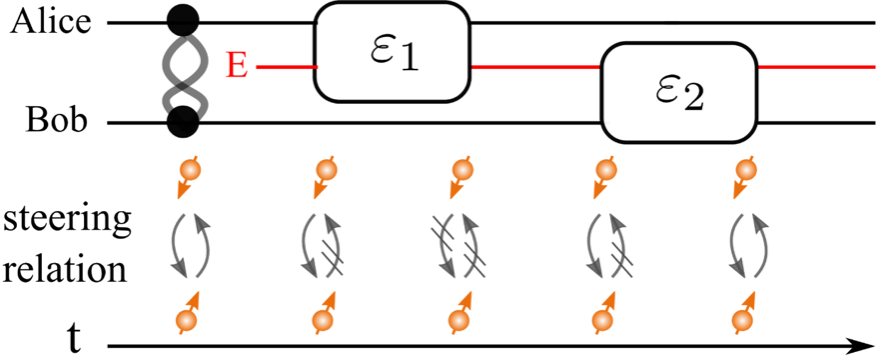USTC Observes Non-Markovian Evolution of EPR Steering in Quantum Open Systems
A team led by Academician GUO Guangcan from the University of Science and Technology of China (USTC) of the Chinese Academy of Sciences (CAS) explored non-Markovian behaviors of Einstein-Podolsky-Rosen (EPR) steering in quantum processes and revealed the whole evolution of EPR steering in quantum open systems. This work was published in Physical Review Letters.
EPR steering describes a quantum nonlocal phenomenon in which one party can nonlocally affect the other’s state through local measurements, which represents a concept of quantum non-locality between entanglement and Bell nonlocality. Its distinctive directional property allows one-way EPR steering that can provide resources for quantum information tasks. Most previous research on EPR steering is conducted on the basis of closed quantum systems. In fact, the interaction between the quantum system and the environment is almost inevitable and this interaction usually results in a gradual dissipation of the system's information to the environment. However, the non-Markovian environment due to its memory effect allows the dissipated information to flow back from the environment into the quantum system. The specific ability to flow back is influenced by the non-Markovian degree of the environment; the higher the non-Markovian degree, the stronger the information flows back.
In this study, two environments with different non-Markovian degrees are created. First, Guo's team investigated the dynamical evolution of EPR steering in a dissipative environment. They prepared asymmetric states with different parameters to observe the whole non-Markovian evolution under the high non-Markovian process, during which unsteerable occasions are further confirmed under multisetting measurements. Furthermore, researchers studied the recovering ability in various degrees of non-Markovianity. The experimental results showed that the degree of memory effect which is dependent on the degree of non-Markovianity determines the recovery of steering. The higher the non-Markovian environment, the greater the memory effect and the recovery of steering. In addition, the death of EPR steering confirms the hierarchical relationship between entanglement and EPR steering during the whole non-Markovian evolution.

Evolutionary phenomena of quantum guidance in non-Markovian processes (Image by WANG et al.)
This work demonstrates the influence of the memory effects in the non-Markovian process on the evolution of EPR steering in open systems, which deepens the understanding of the directional property of EPR steering and provides new ideas for its application in open quantum systems.
paper link: https://journals.aps.org/prl/abstract/10.1103/PhysRevLett.130.200202
(Written by HUANG Rui, edited by WANG Zhaokun, the USTC News Center)
Back
